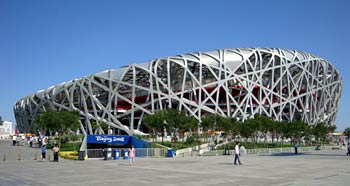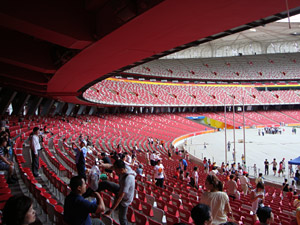By Catherine E. Wood
|

|
| Yesterday's Olympic Park visitors enjoyed a rare blue Beijing sky at the "must-see" venues. [Photo by Catherine E. Wood/China.org.cn] |
Beijing scrambles to find alternative uses for the Olympic Venues before Olympic novelty wears off. Currently the main revenue for venues comes from daily admission visitors, but new ideas like summer concert series and racing could bring the stadium into the black.
Yesterday afternoon a blue sky and bright sunlight pierced through the top of the Bird's Nest, a true treat for thousands of visitors Beijing's Olympics venues receive. Looking around, millions of golden confetti sparkles illuminated the sky, giving a testament to the grandeur and excitement of the previous night's summer concert.
Stadiums, as a whole, do not tend to be big revenue generators and usually operate at a loss. Beijing especially, is working diligently to put the monstrous price tag of the Bird's Nest complex behind them, exploring new avenues of earning income.
|

|
| Visitors to the bird's Nest enjoy the remnants of the summer concert series set as workers get ready for a new event. [Photo by Catherine E. Wood/China.org.cn] |
Since the Bird's Nest opened to the public on last year's National Day holiday, the venue has seen upwards of 3 million tourists. Since tickets cost 50 yuan (US$7.3) a piece, admission revenue should be enough to cover the estimated 70 million yuan (US$10.2 million) per annum maintenance costs, so opportunity for operating at a profit, at least for awhile, is plausible.
Visitors to the Bird's Nest come for a variety of reasons, mainly the Olympic novelty currently. Blanca, a teacher from Texas said "The Olympic venues are a must see! If I had come to Beijing and not seen the Olympic venues, I would feel like I was missing something."
When asked if visitors thought the 50 yuan they paid to come inside the Bird's Nest was worth it, all agreed it was, but they would probably not come back. A French woman remarked that the admission was too high for local populations to have to pay; I am inclined to agree considering one ticket can be upwards of 6% of the average Chinese monthly income (according to: zhidao.baidu.com). James, an overseas teacher whom we caught napping on the concert Astroturf remarked "well, it was worth it for the nap."
However, it is no secret that despite the large population China has (which the Olympic venues are counting on to keep visitation strong,) the real danger is the novelty of the Beijing Olympics wearing off. As we get further away from 2008 and move towards London's 2012 games, visitation at the venues will drop dramatically; it's the harsh reality. The only way to avoid causing a massive "money-sink" is to convert the uses of the venues and change them into a staple for Beijing entertainment and night life.
|

|
| Daily admission tickets to the Bird's Nest, a favorite among the Olympic venues, prove to be the leading revenue builder for the site. [Photo by Catherine E. Wood/China.org.cn] |
June 30, 2009, a year after the Olympics, the Bird's Nest hosted the beginning of a summer concert series. The opening concert showcased Song Zuying, Jay Chou, Placido Domingo, and Lang Lang, all national favorites amidst a gilded modern stage that would make any Hapsburg jealous. This is one of the many plans to transform the Bird's Nest into a profitable Beijing hotspot.
Beijing's Bird's Nest Summer Concert Series is expected to develop into a long-term brand put on annually, starting each June 30. Officials are predicting this as a great way to continue promoting Chinese culture with the rest of the world, a continuing primary objective for China.
Other upcoming events include the opera Turandot, staged by Zhang Yimou (chief director of opening and closing ceremonies at the Beijing Olympics), will begin on October 6. Additionally Beijing's first international car racing festival, the 2009 ROC Nations Cup will be held on November 1, 2009.
Consequently, if these alternative events do not turn profitable, Beijing is toying with the idea of selling the naming rights of Olympic venues to private companies. Previous Olympic hosts like Atlanta and Sydney have also sold off their stadium's naming rights, this isn't a new idea.
None of the visitors we talked to had heard about the upcoming events for the Olympic venues. Venues are going to have to start advertising heavily to catch the public's attention and avoid selling naming rights.
(China.org.cn July 2, 2009)